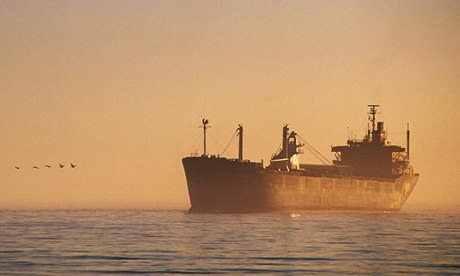
Installed as writer-in-residence for the Danish container-shipping giant Maersk, Horatio Clare made two journeys across the world recording, in his notebook, the daily life of freighters. As he says, the book that emerged "is partly the report of an observer and partly the story of a participant".
The first half of Down to the Sea in Ships charts a two-month course from Felixstowe to Los Angeles via the Suez Canal and China in a monster of a vessel; the second describes a journey from Antwerp to Montreal in "a ragged old battler". Clare leavens his story with nuggets of seafaring history, from wartime disasters to suicides on the unbearable Cape Horners in the dusk days of steam and wood. Notes and extracts from other watery writers are judiciously incorporated – from Coleridge to Jerome K Jerome and, of course, the master: Conrad.
A youngish journalist and nature writer whose previous books include the well-received memoir Running for the Hills, Clare deploys lengthy passages of direct speech, allowing shipmates to speak for themselves. He conjures life on board, from the scream of steel to the lonely strumming of the engine in a stairwell at night-time. The scale of operations is dizzying. "Turning the ship to face the sea is a behemoth ballet," he writes of Gerd, his first ship. Gerd is hauling, among many hundreds of thousands of consumer items, 500 tonnes of rubber gloves, 40 tonnes of pet food and 70 tonnes of edible fats and oil, the latter en route to Peru.
It was not plain sailing – diesel fumes overpower the author's cabin and the food includes fried Spam. Maersk, for safety and security reasons, makes Clare disembark for a segment of the first voyage (though, admirably, the company did not demand the right to vet his manuscript). And although Clare admits he is "in love with the wonder and rough romance" of big ships, he is also cognisant of the dark side – danger, boredom and what he calls the "moral disgrace" of the low and unequal pay handed to heroic Filipino seamen.
There is also a Freddie Truemanish theme, as older sailors report that life aboard is not what it once was ("Ships used to be much more sociable places," the chief engineer regrets, "but now everyone takes DVDs to their cabins" – a metaphor for the world, perhaps). Similarly, Clare reveals that the container business is on its last – sea – legs. Stringent EU financial regulations have rendered operations economically unviable. Commerzbank, the world's second-biggest provider of shipping finance, has shut down its €20bn shipping fund and now runs a fleet of foreclosed vessels. But surely Gap jeans still have to get from Bangladesh to London? Clare could have explained this better. In many ways, plainly, he thinks he sings a threnody for something that is going, if not yet gone. I was not convinced.
His prose can be mannered, but he excels in descriptions of the oceans, sky and weather. As the ship approaches Egypt, the "moon's broad path is cut with shadows like phantom ships. The air is milky and hot. The sea lies right down, darkest silver blue and alive…" And here in the South China Sea: "The waves are a metallic lacquer-yellow and the sky a melancholy of greys." Clare is an engaging narrator and an excellent travelling companion. The story that unfolds in these pages is seldom becalmed.
Affection for the ships, the ocean and the sailors shines from every page. Clare is interested in the individual spirit of each ship, describing the old batterer at one point as "sentient". And then comes this fanciful remark: "With crews always male, or overwhelmingly so, the ship becomes a strange plait of feminine archetypes – wife, mother and mistress." The author has deep respect for the seamen's abilities. "The mood on the bridge is both alert and easy," he writes during one busy watch, "an atmosphere you begin to recognise, the professional calm of men who maintain the world, out of its sight." At journey's end, he acknowledges that the women and booze of Montreal "were surprisingly scant compensation for the comradeship of seafarers".
Clare is grateful for his colleagues' acceptance, recognising that he cuts an odd figure in such company and, after all, there was no reason why anyone should accept him. Talking to a couple of young Indian crewmen out on the town in port, he comments: "I cannot help feeling that their civilisation knows mine of a foppish, effete and idle abstraction which cannot even look up its own train timetables without Indian help."
This is a warm and lyrical book about a tough trade in tough times. The author concludes: "I thought I went to sea to find out about ships and oceans, but though I saw something of those, I saw much more of men."

